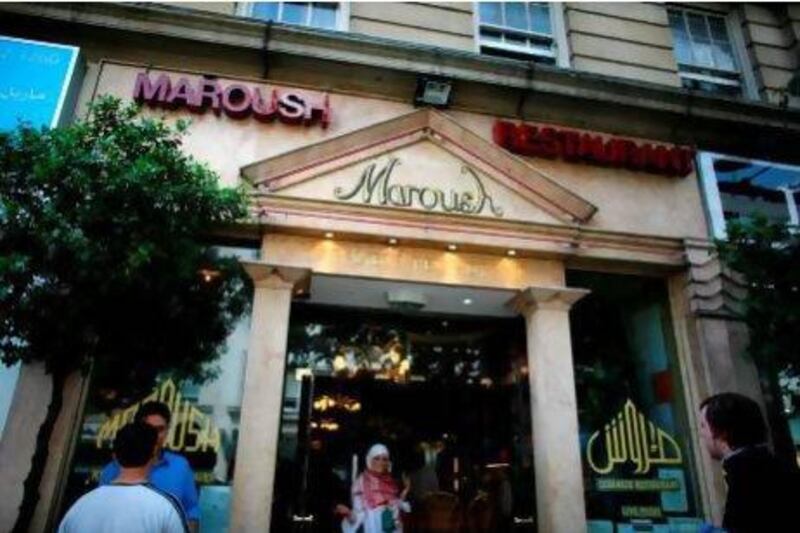LONDON // Move over fish and chips, chicken tikka masala and Yorkshire pudding.
Hummus, the chickpea staple of Arabic cuisine, is fast becoming a favourite food in the UK, and more than four in 10 Britons keep a tub in their refrigerator.
With about 12,000 tonnes sold every year, hummus is also big business in Britain, estimated to be worth about £60 million (Dh344m) a year.
A survey of what people keep in their fridges, by the electrical goods manufacturers Sharp, found that Britain has become the hummus capital of Europe.
The finding confounded the British media, many of whom turned to the Israeli-born celebrity TV chef Yotam Ottolenghi - who along with Palestinian Sami Tamimi owns a string of gourmet delicatessens and Mediterranean-themed restaurants around London - for an explanation.
"It's filling and sustaining but still has a healthy image, which is justified in many ways," he says.
"Chickpeas have lots of protein and tahini is a much better source of oil than many others. But in all honesty, I think it's mainly the flavour," Mr Ottolenghi told The Guardian newspaper.
Along Edgware Road, the always bustling central London hub of Arab shops, cafes and restaurants, the news was greeted with some surprise.
Hummus is everywhere, said Jad Issa, manager of the Sannin restaurant. "I don't know how it happened, but it's in all the supermarkets."
Mr Issa said more Britons were frequenting Edgware Road restaurants than when he moved to London from Lebanon 10 years ago, but he was unsure how hummus grew so popular, and a little reluctant to classify the varieties available in supermarkets as the genuine article.
"I like it. I sometimes buy it myself. But it's not necessarily what we would think of as hummus."
Further down the road, Yousef Shamas, the head chef at the Maroushi restaurant, agreed.
"Europeans tend to treat it either as a dip or as a part of a healthy diet," said Mr Shamas, who trained in Beirut.
He suggested the perceived health benefits were a major draw in Britain, where hummus is often served as a dip with raw vegetables, in contrast to the Middle East, where it would not be eaten cold, straight from the fridge.
"For us, we eat it in many ways, for breakfast or with lunch. But we have it with bread, not carrots or celery. Bread adds calories. The tahini already contains some fat, so it's maybe not all that healthy."
Britain's large supermarket chains all produce their own brands of hummus, unlike in the US, where the dominant brand is Sabra, a New York company co-owned by the Israeli Strauss Group which has cornered about 60 per cent of the Dh1.1 billion-a-year market for ready-made hummus.
In 2009, Israel and Lebanon became embroiled in a "hummus war" after Sabra made a world-record sized hummus in New York. The Lebanese Industrialists Association considered a request to the European Union to accord hummus special status as uniquely Lebanese food. So far, no action has been taken.
Lebanese chefs did, however, snatch back the Guinness world record in 2010 with a hummus weighing nearly 10,500kg.
Ultimately, said chef Shamas, it mattered little.
"Anyone can make a good hummus. Israelis can make good hummus. With the right ingredients, you can make one at home, where it should be made. In that way, hummus now belongs to the world.
But "as far as I am concerned, hummus is a traditional Lebanese - or Syrian and Palestinian - dish. It's part of our history and a window on to our culture."
Across the street from Maroushi, at Sitt Asham, a Syrian restaurant, Ahmad Mohammad, 37, an accountant on holiday who works for the Hilton hotel group in Dubai, was in little doubt about where hummus belongs.
"I love hummus. I don't know much about it. But I know this: it belongs to Arabs."
At a table next to him, Nick Snewdon said he'd never particularly thought about where hummus came from other than that it was Mediterranean.
The 45-year-old stockbroker also confessed to being surprised about its popularity among his fellow Britons. He said he "quite liked" hummus, but the reason he came to Edgware Road was quite different.
"I come for the hubbly bubbly."
twitter: For breaking news from the Gulf, the Middle East and around the globe follow The National World. Follow us






